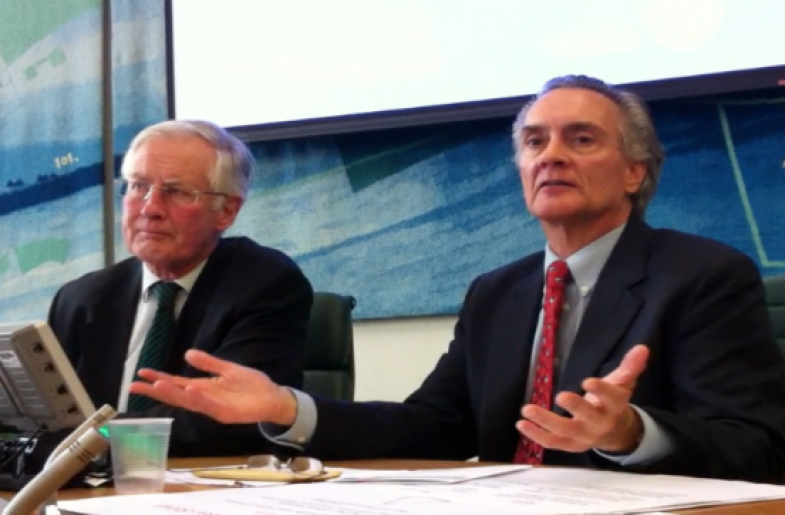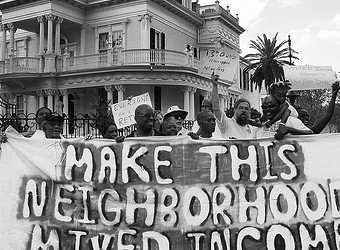Twelve seminars in twelve days? Each on a different topic?
Imagine the angst I felt last winter when organizers in London approached me to make this demanding array of presentations on consecutive days.
They explained that each of the sponsoring groups had a unique perspective on the commons, ranging from economics, business, politics, democracy, culture and technology to land reform, private property, trusteeship, interest rates, systems theory and spirituality.
Once I’d grasped the constellation of issues, I welcomed the challenge of integrating them with the commons. It sounded like real fun. After extensive preparations, the Quilligan Seminars were held from May 7 – 18 at various locations in London. (For reference, here are my talking points on all the sessions .)
Co-hosts of the seminars included the House of Commons, Institute for Public Policy Research, New Economics Foundation, Finance Innovation Lab, St. James’s Piccadilly, Synthesis, Civil Society Forum, Working in Trust, Gaia Network, Initiatives of Change, SimPol, School of Economic Science, Henry George Foundation and Hub Westminster.
Sheepishly, I’d wondered how reintroducing the topic of commons in the nation which invented the name “commons” would go over. Yet what better place to launch the seminars than at the House of Commons?
On a rainy morning at Parliament, I spoke to seventy people on “Political Economy and the Inclusive Commons”. Michael Meacher, Member of Parliament and former Minister for the Environment, chaired the session.
Over the course of twenty minutes, I described how commons trusts could place a preservation cap on particular commons and determine the proportion of these resources which could be rented to businesses for extraction, production and commerce. In turn, businesses would pay taxes on their profits to government, which would then channel these funds into social dividends and the replenishment of depleted commons.
“That was really very inspirational,” exclaimed Meacher following the talk. “I have been in politics for a very long time. I don’t think I have been challenged by such radicalism as long as I can remember, a radicalism that is not just a fantasy but a radicalism tied down with specific concepts which are, in the long term, inevitable. I have just learned a huge amount. It is one of those occasions where I feel we are just starting.”
Many others shared this spirit. Lord Maurice Glasman, the Blue Labour Member of Parliament, confided to me, “This is the House of Commons. It’s high time that our leaders live up to that name.”
All of the seminars were enthusiastically received. They were also well attended, with audiences ranging from thirty to one hundred. Most came for one or two presentations. About twenty people attended six or more of the seminars.
Along the way, I met with politicos and financiers, lawyers and academics, members of charities and think-and-do tanks, crowdfunders and technological entrepreneurs, advocates for cyber-democracy and global governance, land reform organizers and land trustees, environmentalists and anti-usury campaigners, religious congregations and clergy, neighborhood groups and Occupiers, and a large contingent of activists from Greater London’s civil society.
I had many memorable dialogues with seminar conveners and colleagues. Some of the most brilliant moments occurred with Lord Glasman on the new economics of replenishment; with Inderpaul Johar on innovative directions in social technology; with Esther Ridsdale on horizontal decison-making in business; with Tim Jenkins on the political salience of trusteeships; with Joseph Milne on the history of property ownership; with Rector Lucy Winkett on sustainability and religious covenant; and with Greg Fisher on complexity theory in economics. All of which were centered on the commons.
Many people approached me to say how much they had learned and grown from the seminars. But the sessions were really a learning experience for me as well.
It was mind-stretching to talk with so many different kinds of audiences. The wide variety of people, presentations and questions generated an immersion experience that was highly creative and inspirational.
To realize how quickly the commons is becoming part of the Western zeitgeist was also deeply humbling and encouraging. When I first spoke in London three years ago, my audience was a bit fuzzy on the significance of the commons. Now Londoners clearly get it and are eager to take action.
At our final event, working groups organized around many of the issues which emerged from the seminars. These groups are now focused on examining community currencies; designing maps and visual images of the commons; developing commons for health, well-being, gardens and housing; generating outreach for the commons; linking Occupy and commoning; and creating a knowledge ecology of resources through the website Commons Rising, which was recently launched by the School of Commoning.
The seminars were superbly organized by my colleagues Anna Betz and George Por at the School of Commoning and Peter Challen of the Christian Council for Monetary Justice, with the support of Nancy Roof from Kosmos Journal and many individual donors.
All of the sessions were videotaped and will eventually be available through Commons Rising, as well as You Tube clips. A datagraph and an e-book of the presentations are also being developed. You can help us meet these goals with a donation. You can also follow Commons Rising for updates or to get involved with the “London working groups”:http://commonsrising.ning.com.





